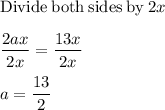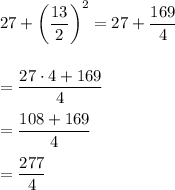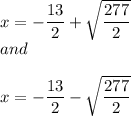Answer:
Solutions are

Explanation:
The given equation is x² + 13x + c = 0 with a = 1, b = 13 and c = -27
We have to transform this equation to the form
a(x + a)² + b = 0
The given equation is

Move the constant -27 to the right side by adding 27 on both sides
==>

 :
:

Compare

We get




left side is

right side is

So the equation in complete the square format is

Taking square roots on both sides



Solutions are

which can be rewritten as
